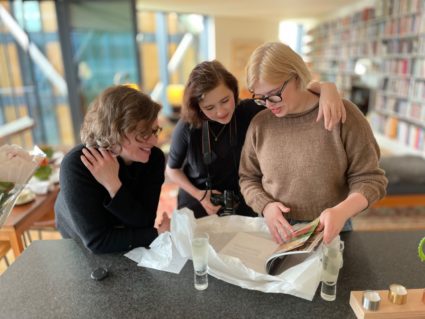a book I would marry if I were single

But first: do you, devoted readers, notice the tiny little changes to my blog template? For one, a rare photograph of me (not often seen in captivity). It is just about the only photograph of me that I have ever liked, although my mother in law objects and says she likes laughing photographs better. Fair enough, but this one is just fine, plus I think it adds a little piquant, modern touch to my otherwise basic blog. The little wrenches everywhere? Not so sure about those and totally clueless about how to remove them. Suggestions gratefully accepted.
And, although I’m not sure what the point of this is when my poor blog is actually a private concern, you may show any allegiance you feel by listing yourself as a “follower” of the blog. Feel free. Keeping up with technology could be a full-time job if I let it.
Much more to my liking is to happen upon a book, about cooking of all things, that makes me laugh out loud on the bus, then slam the book shut and try to look out the window, only to dip in again and again find myself incurring covert looks of fear and loathing. Generally speaking, people who laugh out loud on London buses should be avoided. Finally I put the book in my bag. But you must find yourself a copy, The Pedant in the Kitchen. I’ve given you a link to the paperback, but I am proudly clutching my pre-credit-crunch hardcover bought at the incomparable Books for Cooks and apparently shelved immediately, I know not why. I know Julian Barnes to be a novelist, but I’ve never read anything else he’s written (I did rush to my bookshelf to see if I have any of his other books, something that happens with embarrassing frequency: “Oh, look! I wonder where that came from”). I offer you this:
Being a great cook is one thing; being a decent cookery writer is quite another, and is based — like novel-writing — on imaginative sympathy and precise descriptive powers. Contrary to sentimental belief, most people don’t have a novel inside them, nor do most chefs have a cookbook. ‘Artists should have their tongues cut out,’ Matisse once said, and the same — if even more metaphorically — applies to many chefs. They should be chained to their stoves and merely allowed to pass food through the hatch as we require it.
and
The relationship between professional and domestic cook has similarities to a sexual encounter. One party is normally more experienced than the other; and either party should have the right, at any moment, to say, ‘No, I’m not going to do that.’
I’m about halfway through and it’s all good. There’s a common denominator to books I like about cooking: they are stories first, and then there is the food. Barnes does not provide a single recipe, which in a way lets him off the hook rather handily. I’m also greatly enjoying my second run through a little-known food memoir called Potboiler, by Robert Canzoneri, a lifelong professor of English at Ohio State University. The book is summed up in the subtitle (all academics add subtitles to their books), “An Amateur’s Affair with La Cuisine.” He was the rankest of amateurs when rather late in life he acquired a new, very young wife and with her a kitchen that did not contain, naturally, his old, not so young wife who had cooked every meal for him during their marriage. He plunged in with gusto and the recipes vary from the simplest pasta sauce and homemade baguettes to Crabmeat Justine and Rock Cornish Games Hens Stuffed with Pine Nuts. But it’s the stories that anchor the book. The recipes are a bit of a cheese course: nice, but not necessary.
Another irreplaceable favorite is Lillian Hellman’s Eating Together: Recipes and Recollections, which tells you all the dirt you always wanted to know about Dashiell Hammett but felt prurient so you never asked. And great recipes. I am heartbroken to discover I left this book in Connecticut over the summer and have, credit crunch or no, ordered another copy to have here. And of course there is Ruth Reichl, whose “Tender at the Bone: Growing Up at the Table” is also not to be read on the bus, and none the worse for that: a simply crazy childhood for the New York Times food critic and editor of Gourmet Magazine.
It occurs to me what all these books have in common: they are written by writers, not chefs. Of course these people can all cook, and do cook, and very well I’m sure. But first and foremost, they write. Our intrepid tutors Orlando and Tamasin drilled this into our heads more than once in Devon: we are writers first, and secondly food writers. I think that an overlooking of this distinction accounts for 99% of the rubbish cookery books out there. You cannot just be able to cook, to be able to write about cooking.
Right, rant over. This evening will bring a reluctant me to the swimming pool (it’s raining and cold and my firelit study is very appealing), and then a rare thing: dinner out! A couple of new friends are taking us to the Chelsea Arts Club, a place I have never been for the simple reason that until now I have never known a member of it. I’ll report back if it’s a blogworthy story, rest assured.

